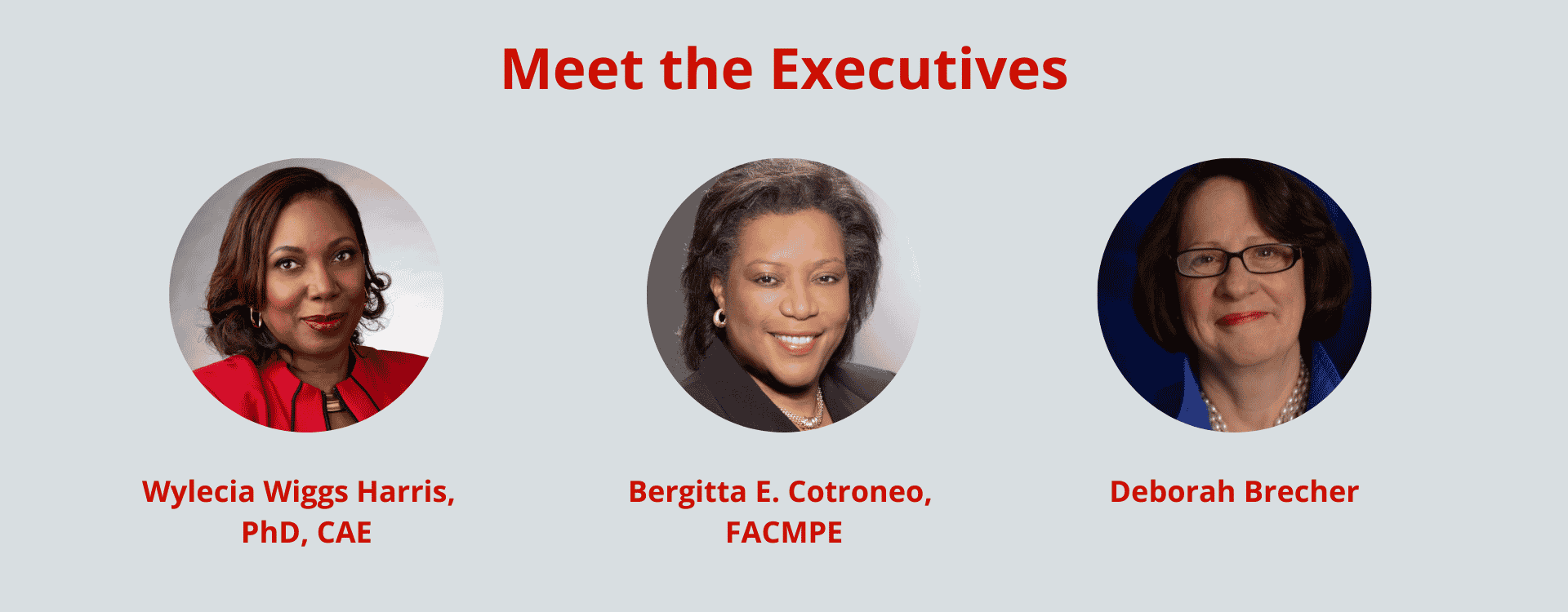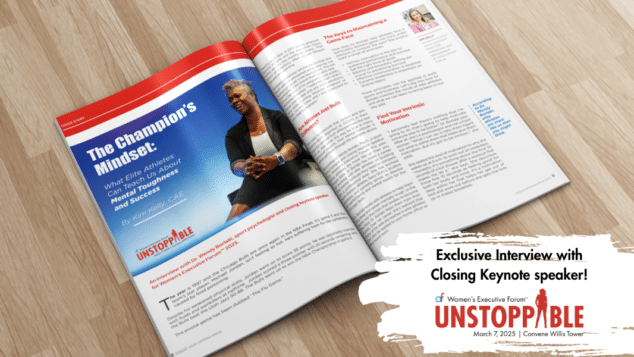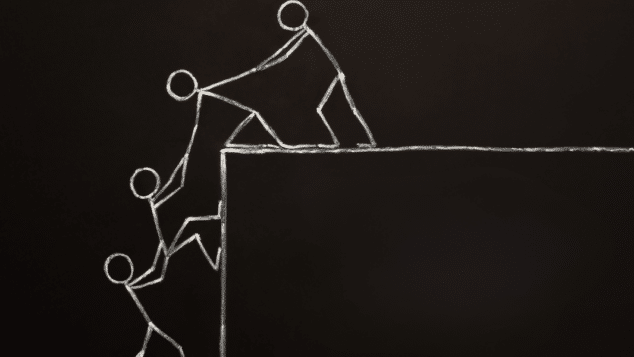Leading in Today’s Environment

CEOs of all organizations have faced unprecedented challenges over the past five years—a global pandemic, a resurgence in the racial justice movement, and the “Great Resignation.” According to the Conference Board, labor shortages are driving talent retention and recruitment to the top of the CEO agenda. To uncover how association leaders have navigated these rough waters, Candice Warltier, CEO at CS-Effect, a strategic communications agency, spoke with association leaders and consultants to determine what leaders need to be successful.
The leaders we spoke with are Wylecia Wiggs Harris, PhD, CAE, CEO, AHIMA; Bergitta E. Cotroneo, FACMPE, Deputy CEO & EVP, Alliance for Academic Internal Medicine; and Deborah Brecher, President and Managing Director, Tandem Group. Each of these women have a wealth of experience in association management and have given a lot of thought to the ways the pandemic and cultural events have shaped leadership over the years.
Below is a video featuring clips from these conversations. Read on for the full interviews.
What are the biggest challenges leaders face in today’s environment?
Wylecia Wiggs Harris: The Great Resignation and talent retention are at the top of the list. We are all feeling the pain of the revolving door as we hire new staff and the time it takes to onboard those individuals and understand the culture in the organization. And, as soon as you get them in, others leave; so there’s a need to double down on culture.
Associations face unique challenges. We have a unique model that sometimes doesn’t allow us to move at the speed we want to move. Not only do we face competition from other associations and nonprofits, but also from for profit entities. This is especially true from an educational perspective and we struggle to have the agility that other organizations have. We also have multiple stakeholders and sometimes it can feel like we need to be all things to all people. But we need to focus as we try to navigate.
Bergitta E. Cotroneo: First, there is the personal challenge of navigating this parallel universe we all deal with—managing your career and also managing the matriculation of the organization you are leading. There is a need to balance and evaluate what is best for the team. You have to figure out when is best to step back and allow the team to thrive. Of course, your board or invested volunteers see you as the catalyst, so it can be hard to let go.
The Pandemic taught us that burnout is real. Identifying the right time and circumstances to delegate and allow folks on the team to take over and use their skills and knowledge to move the organization forward is essential. It also requires being comfortable with uncertainty and a bit of risk.
Deborah Brecher: Covid has had an extraordinary impact. Some on revenue, clearly a good deal of it is on talent, who does the work and how they do the work. Now everyone is struggling with what they mean by hybrid. It is interesting to see how the pendulum has swung from employers owning the game to employees owning the game. Which means you have to think about how you want to interface with them as a culture. Particularly CEOs that I am working with are struggling. There is a belief that if people aren’t coming in [to the office], it will negatively impact collaboration and innovation. Talent—people—are much more in the driver seat because they have spent two years thinking about what is important to them.
Additionally, in the next five years a huge portion of the talent pool will retire. Retirement of baby boomer talent is going to force us to get creative about how we think about talent, who we bring in as talent, how we parcel out work, and the role of people retained.
What challenges are unique to women leaders?
Bergitta E. Cotroneo: I think one of the biggest challenges right now is finding great opportunities that are also a great fit or next step for your career path. Networking from your screen is difficult to do. The pandemic causing us to continue to shelter in place has widened that gap. Women need compensation equity and real, supported opportunities to build on their ideas (being heard and taken seriously). Respect for the knowledge and skills we bring to the table is paramount. The chance to really show your organization and board what you can do, and have them trust [in you] is really a challenge, particularly for women of color, but also for women across the board.
Deborah Brecher: We have seen a great deal of erasure of our progress during covid, predominantly because of childcare issues. Women were making all kinds of choices that did not include coming to work because they had no other options [for childcare]. It will take years to rebound.
What leadership traits are needed to succeed in today’s workplace?
Wylecia Wiggs Harris: There has always been discussion around what is the balance between the hard or tech skills and the soft skills. I believe you need both as a leader. Today it may be tilting toward soft skills—the ability to be empathetic and to demonstrate compassion in the workplace is critical. The ability to be courageous as we face so many obstacles and figure out how to address them. Relationship building remains an important skill but at the same time the ability to deliver on results is important. These are businesses we are running—even though we are nonprofits—there is still a bottom line that we need to make sure we are addressing [while] we demonstrate our care and concern for those we serve.
I will argue that we should have always been empathetic and compassionate leaders. Why is it different now? We have gone through a collective experience of a pandemic and now have a greater appreciation for what our employee base and members go through and what we ourselves have gone through. This collective experience has helped us understand that we can balance the need for drive and need to ensure we accomplish results with the need to care and be empathetic. Also, this generation has different expectations than those in the past. They want to work for employers that they believe care about them—not just as an employee, but as an individual.
Bergitta E. Cotroneo: A few years ago I would have answered this differently, but right now, Navigator is number one. [This skill is important to] move through all the social and emotional issues that our country is dealing with that comes to the workplace … because we are all human.
Another is being a Facilitator. I love sports, and I often think of work teams like sports teams. I think leaders have to be flexible depending on the current state of the business. Sometimes you need to be a quarterback, at other times a point guard or catcher. In many ways, the catcher position is most important because it is the person on the team that is actually looking at the field (a global view). All the other folks on the team have their backs to where the ball is going—they have a very narrow, focused view of the field. How many times have we missed a business opportunity or decision point because our view is too narrow, communication is limited, or resources aren’t appropriately allocated? Leadership is like that. Someone has to have their eye on where the ball is going.
Deborah Brecher: The first thing we should be thinking about is what do we as leaders to engage employees so they are willing to contribute the discretionary energy that they have. We aren’t in the same hallways anymore.
EQ, while always important, is much more important now. The capacity to demonstrate trust, respect, compassion, empathy, clarity of communication. Much more highly developed capability on the soft side [is essential]. It used to be nice to have and now it is necessary to have. If you can’t do that with your employees, they aren’t going to play.
In your opinion how have global and social events (including the pandemic) changed how we lead?
Wylecia Wiggs Harris: Personally, it’s made me be more reflective. It’s made me make sure I understand my North Star and my value system and that I have clarity on those. At end of the day, when it gets tough, you have to know what you believe in so you can fall back on that belief system to help you get up and go through challenges of another day.
I talk a lot more about mental health. [I’ve talked] more about mental health in the past two and a half years than I did all the years before that. I don’t see that changing. Fundamentally, I believe that if we are going to have healthy organizations, we need to develop healthy leaders. That is one of the positive things that has come out over the past two and a half years and the political and civil unrest.
Continuing to have this conversation about mental health and mental well-being is something I do want to carry forward. I’ll continue to be reflective and make sure I am guided by my personal North Star.
What responsibility do leaders have to address issues that impact our society—including women’s rights and racial issues?
Wylecia Wiggs Harris: At end of the day, CEOs are people too and we may or may not share the same values as our workforce. It is important we are authentic. In the wake of George Floyd’s murder, a number of organizations came forward with statements and for some they were sincere statements backed by actions, while others were just statements. It is important whether we choose to weigh in or not, that we are authentic. If we choose to put forward a statement, that we have action behind it. The worst thing we can do is to feel pressured to take a stance and put a statement out there that we have no intention of backing up. That impacts our personal credibility as leaders and our credibility as organizations.
I believe it is more important to be true and authentic than to take a stance that we have no intentions of backing up by changing behaviors, policies, and procedures.
Bergitta E. Cotroneo: The George Floyd tragedy was something that in the Black community was known, meaning over decades these types of tragedies have occurred over and over again. So, it wasn’t new to us nor was it news because it has been happening to us for so long. It’s difficult to hide from it as a leader. Because more people are willing to talk about racism, violence against people who are seen as different, or “less than,” it is almost impossible to ignore. The leadership challenge and responsibility is to figure out how you can lead authentically, put words into action, and commit to trying to create impactful change from the spot you’re standing on. It’s very hard to say that you are unaware or these incidents don’t impact us because it impacts everyone.
True responsibly lies in how we act and use the platforms we are given—it’s about intentionality. Are we actually implementing policies that support the statements we post on our websites or tweet? Are we advocating for ethical behavior? And what happens if the behavior is discriminatory or racist? What do you do if it’s a staff member? A board member or volunteer? For leaders, it is about the response and action—as opposed to just verbalizing what’s important. It is probably the riskiest thing any leader has to confront right now, so there has to be clear understanding about what an organization will support or not. Depending on your personal perspectives or believes, it might be uncomfortable.
Uncomfortable or not, leaders have the responsibility for putting it on the table. Sometimes you need to make tough decision. Sometimes people at the governing level aren’t ready or don’t want to and then you have personal decisions to make about how long you can stay in that environment. [It] comes down to how will you use the platform given to move the conversation forward?
What advice do you have for up-and-coming leader?
Wylecia Wiggs Harris: Make sure you have a strong support system. These are difficult jobs, and they are lonely jobs. You have to be careful with whom you communicate and what you share, and you can’t always share everything, so you have got to have a support mechanism that you can let your hair down with and that is a safe space for you to share what you are thinking and feeling. Without that, we are unhealthy leaders.
Bergitta E. Cotroneo: I would say to future leaders, don’t put yourself in a box, and don’t let anyone else do it. Continuing education is important, but not just formal programs. Read the newsletters, online community threads and posts that come your way. Be curious about what is going on in other industries. There are often trends in other industries—airlines, hospitality, etc., that can be applied to your business paradigms. Innovation can come from many different places. Open your mind (and emails) to a few industries that aren’t in your space, and be receptive to learning what they are doing and how those businesses are being led. Be open and aware for opportunities to learn and engage from people in your own organization that don’t hold traditional leadership titles.
When mentoring or coaching a person of color, I tell them to also be aware of the nuances; that it is important to learn to read the room or situation. Often, others (by action or commentary) will reveal things that do not align with what the organization says it is about. Nothing has changed, you just have more information, so how are you going to use that?
Deborah Brecher: The younger generation is more purpose driven. They want more say in what work they do and how it gets done. The notion of boss and subordinate needs to get fuzzy. We need to honor that different people bring different things including young people. It’s not that they don’t know, they just have different experiences than we do.
Understand what your employees are doing in the other 90 percent of their lives when they aren’t in front of you. We are no longer able to pretend that the people who work for us are not human beings and don’t have things they have to manage. We all do and that changes in different parts of our lives. If you want someone to commit, you need the whole person to come to work—not the pieces that you prefer.
Tags
Related Articles
Refill Your Cup: Summer Wellness Tips for Busy Professionals
Discover simple, effective ways to recharge this summer so you can show up as your...
The Champion’s Mindset: What Elite Athletes Can Teach Us About Mental Toughness and Success
An interview with Dr. Wendy Borlabi, sport psychologist and closing keynote speaker for Women’s Executive...
Great Bosses, Greater Impact: Leadership Lessons that Stick
The best bosses leave more than instructions—they leave echoes of confidence, creativity, and leadership that...






